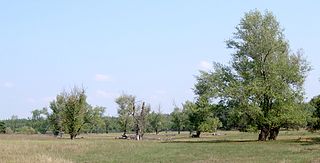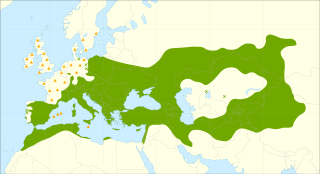
Populus is a genus of 25–30 species of deciduous flowering plants in the family Salicaceae, native to most of the Northern Hemisphere. English names variously applied to different species include poplar, aspen, and cottonwood.

Populus nigra, the black poplar, is a species of cottonwood poplar, the type species of section Aigeiros of the genus Populus, native to Europe, southwest and central Asia, and northwest Africa.

Populus alba, commonly called silver poplar, silverleaf poplar, or white poplar, is a species of poplar, most closely related to the aspens. It is native to Morocco and then Spain through central Europe to central Asia. It grows in moist sites, often by watersides, in regions with hot summers and cold to mild winters.
Festive ecology explores the relationships between the symbolism and the ecology of the plants, fungi and animals associated with cultural events such as festivals, processions, and special occasions. Examples of topics are given below.
Acinetobacter calcoaceticus is a bacterial species of the genus Acinetobacter. It is a nonmotile, gram negative coccobacillus. It grows under aerobic conditions, is catalase positive and oxidase negative. A. calcoaceticus is a part of the A. calcoaceticus-A. baumannii complex together with Acinetobacter baumannii, Acinetobacter nosocomialis, Acinetobacter pitti and Acinetobacter seifertii.

Piceid is a stilbenoid glucoside and is a major resveratrol derivative in grape juices. It can be found in the bark of Picea sitchensis. It can also be isolated from Reynoutria japonica, the Japanese knotweed.
Brenneria is a genus of Pectobacteriaceae, containing mostly pathogens of woody plants. This genus is named after the microbiologist Don J. Brenner.
In enzymology, a cinnamyl-alcohol dehydrogenase (EC 1.1.1.195) is an enzyme that catalyzes the chemical reaction

Phyllonorycter populifoliella is a moth of the family Gracillariidae. It is known from all of Europe, except the British Isles.

Aspen is a common name for certain tree species; some, but not all, are classified by botanists in the section Populus, of the Populus genus.
Acinetobacter nectaris is a gram-negative, oxidase-negative, catalase-positive, strictly aerobic nonmotile bacterium from the genus Acinetobacter isolated from floral nectar pollinated by Mediterranean insects in the Doñana National Park in the Huelva Province in Spain. Bacterial communities, including microbes identified as A. nectaris are closely associated with plant communities; other strains of bacteria have been found in environments that mother bees visit. This bacterium was first characterized in 2013.
Acinetobacter harbinensis is a gram-negative and strictly aerobic bacterium from the genus Acinetobacter which has been isolated from water of the Songhua River in Harbin in China.
Acinetobacter puyangensis is a Gram-negative, rod-shaped and non-motile bacterium from the genus Acinetobacter which has been isolated from the bark of the tree Populus x euramericana.
Microbacterium populi is a Gram-positive, non-spore-formin and aerobic bacterium from the genus of Microbacterium which has been isolated from the bark Populus x euramericana.
Acinetobacter populi is a bacterium from the genus of Acinetobacter which has been isolated from a canker of the tree Populus x euramericana in Puyang in China.
Corticibacterium is a genus of bacteria from the family of Phyllobacteriaceae with one known species.
Corticibacterium populi is a Gram-negative, aerobic and motile bacterium from the genus of Corticibacterium which has been isolated from the bark Populus × euramericana.
Sphingobacterium populi is a Gram-negative, aerobic and non-motile bacterium from the genus of Sphingobacterium which has been isolated from the bark of the tree Populus × euramericana.
Acinetobacter defluvii is a gram-negative and non-motile bacterium from the genus Acinetobacter which has been isolated from hospital sewage from the West China Hospital in China.
Wohlfahrtiimonas populi is a Gram-negative, facultatively anaerobic and motile bacterium from the genus of Wohlfahrtiimonas which has been isolated from tree Populus × euramericana.





